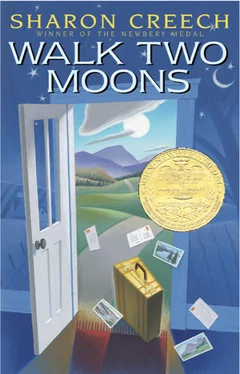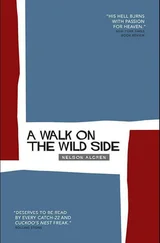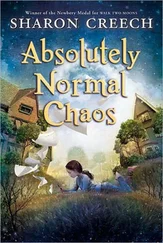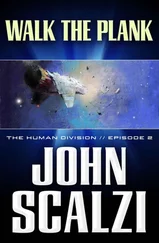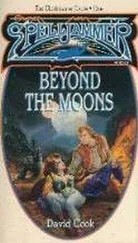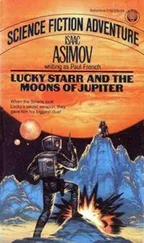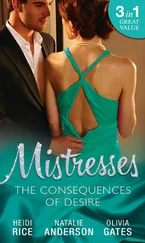All the while, I heard the whispers: rush, hurry, rush . Gram and Gramps moved so slowly. “Shouldn’t we go now?” I kept asking, but Gram would say, “Huzza, huzza!” and Gramps would say, “We’ll go soon, chickabiddy, soon.”
“Don’t you want to send any postcards?” Gram asked.
“No, I do not.”
“Not even to your daddy?”
“No.” There was a good reason for this. All along her trip, my mother had sent me postcards. She wrote, “Here I am in the Badlands, missing you terribly,” and “This is Mount Rushmore, but I don’t see any presidents’ faces, I only see yours.” The last postcard arrived two days after we found out she wasn’t coming back. It was from Coeur d’Alene, Idaho. On the front was a picture of a beautiful blue lake surrounded by tall evergreens. On the back she had written, “Tomorrow I’ll be in Lewiston. I love you, my Salamanca Tree.”
At last, Gramps said, “I sure hate to get back on the road, but time’s a-wastin’!”
Yes, I thought, yes, yes, yes!
Gram settled back for a nap while I said a few thousand more prayers. The next thing I knew, Gramps was pulling off the road again. “Lookee here,” he said. “The Wisconsin Dells.” He drove into a vast parking area and said, “Why don’t you two go look around? I’m going to get a little shut-eye.”
Gram and I poked our noses into an old fort, and then sat on the grass watching a group of Native Americans dance and beat drums. My mother had not liked the term Native Americans . She thought it sounded primitive and stiff. She said, “My great-grandmother was a Seneca Indian, and I’m proud of it. She wasn’t a Seneca Native American. Indian sounds much more brave and elegant.” In school, our teacher told us we had to say Native American, but I agreed with my mother. Indian sounded much better. My mother and I liked this Indian-ness in our background. She said it made us appreciate the gifts of nature; it made us closer to the land.
I lay back and closed my eyes, listening to the drums beat rush-rush-rush and the dancers chant hurry-hurry-hurry. Someone was jingling bells, too, and for a moment I thought of Christmas and sleigh bells. When I opened my eyes again, Gram was gone.
I glanced around, trying to remember where we had parked the car. I looked through the crowd, back at the trees, over at the concession stand. “They’ve gone,” I thought. “They’ve left me.” I pushed through the people.
The crowd was clapping, the drums were beating. I was all turned around and could not remember which way we had come. There were three signs indicating different parking areas. The drums thundered. I pushed further into the crowd of people, who were now clapping louder, in time with the drums.
The Indians had formed two circles, one inside the other, and were hopping up and down. The men danced in the outer circle and wore feather head-dresses and short leather aprons. On their feet were moccasins, and I thought again about Phoebe’s message: Don’t judge a man until you’ve walked two moons in his moccasins.
Inside the circle of men, the women in long dresses and ropes of beads had joined arms and were dancing around one older woman who was wearing a regular cotton dress. On her head was an enormous headdress, which had slipped down over her forehead.
I looked closer. The woman in the center was hopping up and down. On her feet were flat, white shoes. In the space between drum beats, I heard her say, “Huzza, huzza.”
Early the next morning, we left Wisconsin and drove on, eating up the road through the lower rim of Minnesota. The land here was hilly and green, forests tucked in close beside the road, and the air smelled of pine.
“At last,” Gramps said, “some scenery! I love a place that has scenery, don’t you, chickabiddy?”
I had not said anything about what had happened the day before—about being scared down to my very bones when I thought they had left me. I don’t know what came over me. Ever since my mother left us that April day, I suspected that everyone was going to leave, one by one.
I was glad to be able to go on with Phoebe’s story, because when I was talking about Phoebe, I wasn’t thinking about much else.
“Did Peeby get any more messages?” Gram asked.
She did. The following Saturday, Phoebe and I were going to Mary Lou’s again. As we left Phoebe’s house, there on the front steps was another white envelope with a blue sheet of paper inside. The message was: Everyone has his own agenda.
Phoebe and I looked up and down the street. There was no sign of the message-leaver. Mary Lou thought the messages (this one and the other one) were intriguing. “How exciting!” she said. “I wish someone would leave me messages!”
Phoebe thought the messages were spooky. It was not the words that bothered her—nothing too frightening there—it was the idea that someone was sneaking around and leaving them on her porch. She worried that someone was watching their house, waiting for the right moment to leave the message. Phoebe was a champion worrier.
We tried to figure out what the message meant. “Okay,” Phoebe said, “an agenda is a list of things to be discussed at a meeting—”
“So maybe it’s for your dad,” I suggested. “Does he go to meetings?”
“Well, I guess,” Phoebe said. “He’s ever so busy all day long.”
“Maybe it’s from his boss,” Mary Lou said. “Maybe your father hasn’t been conducting his meetings very well.”
“My father is very organized,” Phoebe said.
“What about the other message?” Mary Lou said. “Don’t judge a man until you’ve walked two moons in his moccasins.”
“I know what it means,” I said. “I’ve heard my father use it lots of times. I used to imagine that there were two moons sitting in a pair of Indian shoes, but my father said it means that you shouldn’t judge someone until you’ve walked in their moccasins. Until you’ve been in their shoes. In their place.”
“And your father says this often?” Phoebe said.
“I know what you’re thinking,” I said, “but my father isn’t creeping around leaving those messages. It isn’t his handwriting.”
When Ben came into Mary Lou’s room, she asked him what he thought it meant. He took a sheet of paper from her desk and quickly drew a cartoon. It was a little spooky, because what he drew was identical to what I used to imagine: a pair of Indian moccasins with two moons in them.
“Maybe,” Mary Lou said to Phoebe, “your father is being too quick to judge people at work. He needs to walk in their moccasins first.”
“My father does not judge too quickly,” Phoebe said.
“You don’t have to get defensive,” Ben said.
“I am not getting defensive. I’m just telling you that my father does not judge too quickly.”
Later, we went to the drugstore. I thought it was going to be only me and Phoebe and Mary Lou going, but by the time we left the house, we had accumulated Tommy and Dougie as well. At the last minute, Ben said he was coming too.
“I don’t know how you can stand it,” Phoebe said to Mary Lou.
“Stand what?”
Phoebe pointed to Tommy and Dougie, who were running around like wound-up toys, making airplane noises and train noises and zooming in between us and then running up ahead and falling over each other and crying and then leaping back up again and socking each other and chasing after bumblebees.
“I’m used to it,” Mary Lou said. “My brothers are always doing beef-brained things.”
Ben walked right behind me all the way, which made me nervous. I kept turning around to see what he was doing back there, but he was just strolling along smiling.
Читать дальше
